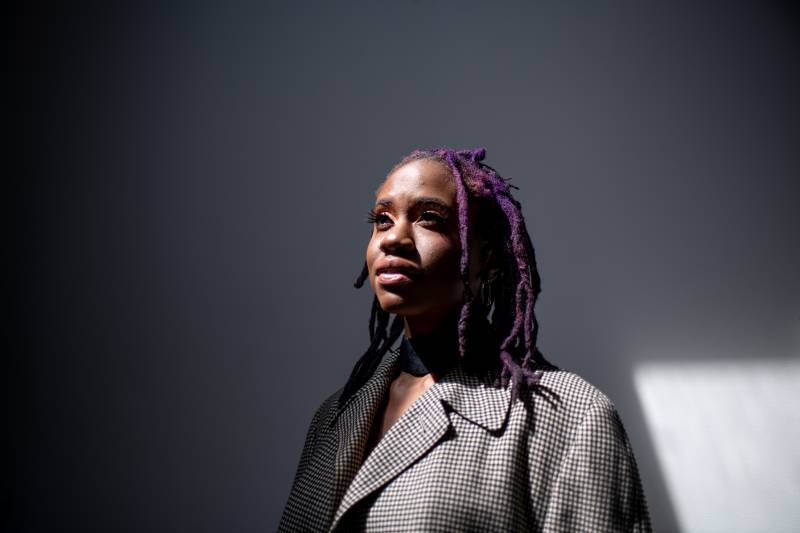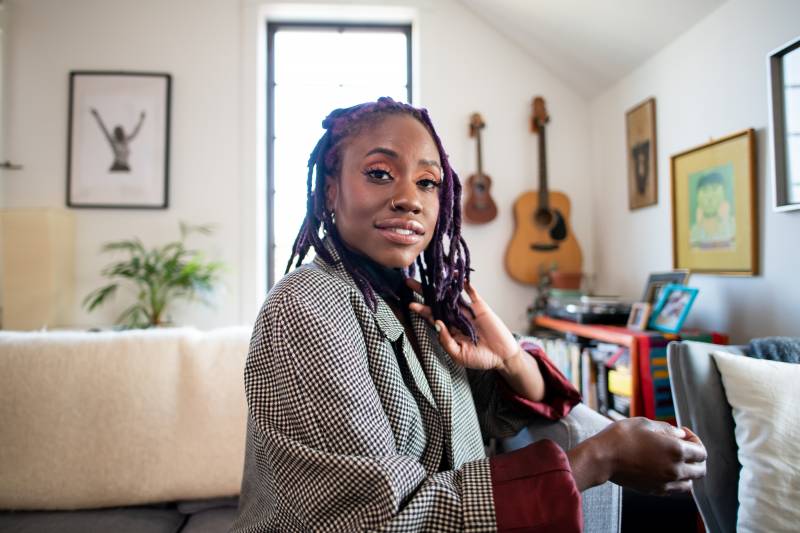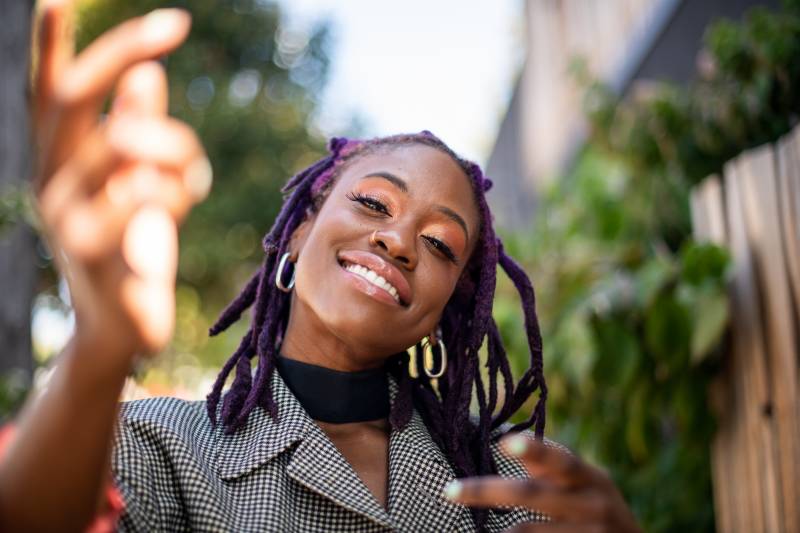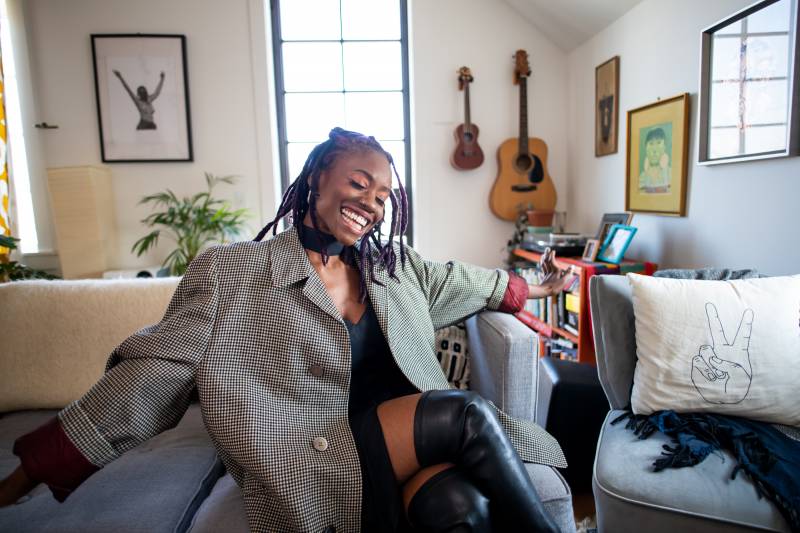In the short film that accompanies The Seshen‘s 2020 album, CYAN, you can tell that singer Lalin St. Juste is not at peace. The dreamlike music video sequence shows her crashing through a ceiling, her body subsumed by rubble; later, she fretfully yanks a door open and runs through a series of empty rooms. When she collapses from exhaustion, a group of friends revive her with their healing touch—a visualization of the spiritual nourishment sisterhood and community can offer.
Looking back on that project, St. Juste admits that it overlapped with a time of turmoil in her life. After years of identifying as queer and bisexual, she suddenly awakened to the realization that “lesbian” more accurately describes how she feels inside. The epiphany forced a reckoning, and presented a set of daunting complications, both personally and creatively. For the past 10 years, her work with The Seshen revolved around her artistic partnership with her now-ex-husband, bassist and producer Aki Ehara. Suddenly, the way she had arranged her life no longer aligned with her truth.
“The origin story of The Seshen is our love—we would talk about the fact that we met [while studying abroad] in Ghana, and fell in love and started this band. That’s been part of the identity and the narrative of The Seshen,” says St. Juste. “Then this thing happened, and it’s so painful. It’s like, how do you publicly share this? Our love is really public, but here’s a moment that things have changed.”

After a year of grieving and healing while concerts were canceled during pandemic restrictions, St. Juste is ready to write her next chapter. On Sept. 17, she released her self-produced first single, “scar,” from her forthcoming EP, behind my eyes. She began writing the EP’s four tracks during a residency at the Oakland music incubator Zoo Labs, which gave her the resources and space to process this huge life shift through music.
“I want to practice sharing who I am in a bigger way,” she says. “Now is that time. All the pieces are falling into place. And I think I needed this big transformation to actually kick me into gear so that I could develop myself as a songwriter and producer.”
In “scar,” a quiet hum grounds the downtempo track in a self-reflective mood that stands apart from The Seshen’s big, propulsive electropop. Snappy snares and soaring synths underscore St. Juste’s optimism about the terrifying, yet ultimately gratifying, process of self-discovery. After a cathartic crescendo of layered vocals, a moment of calm acceptance arrives: “It’s OK, let your heart break,” she repeats to herself in a half-whisper, like a mantra.

“It’s accepting the realities of it, and the pain of it, and the beauty of it,” she says. “This is what it means to love, this is what it means to exist, this is what it means to grow: it’s to feel the growing pains of it all, to feel the discomfort of it all. But what you find in your own scar tissue is a beautiful world of all those experiences, and it’s what makes us who we are.”
St. Juste and Ehara are still close, and they haven’t slowed down on songwriting or performing with The Seshen. “As difficult as everything has been, we’re both really committed to the friendship because that’s been the basis of our relationship from the beginning,” Ehara says.
The expansive band, which also includes drummer Chris Thalmann, keyboard and synth player Mahesh Rao, percussionist Mirza Kopelman and sequencer Kumar Butler, is getting ready to embark on a Northwestern tour next week that concludes with a hometown show at the New Parish in Oakland on Nov. 19.
And St. Juste is pursuing other creative endeavors. She’s releasing behind my eyes on 7000COILS, the new, queer- and Black-focused label she co-founded with her new partner, the DJ KKINGBOO. She’s also creating a sound art piece for the experimental music festival Soundwave NEXT: Translocality, which commissioned a variety of artists to compose location-specific works. Listeners will be able to hear the pieces at different Bay Area landmarks in late October via an app.
St. Juste takes a lot of solo walks near bodies of water to gather her thoughts. “I have this really deep connection to the power of water, the stories water holds, the way it moves in our lives. It’s a place I go to grieve and to celebrate,” she says, noting water’s role in her ancestors’ passage from West Africa to Haiti, where her parents are from.
Her piece for Translocality explores the history of the one of the places she frequents: Sutro Baths, the ruins near San Francisco’s Ocean Beach. In her research, she learned about an unsung civil rights hero, a Black man named John Harris, who in 1897 sued Adolph Sutro for discrimination when he was denied access to the baths. Harris’ lawsuit helped reinforce a new California law that granted equal access to public spaces, and set a precedent for desegregation.

“I’m hoping to create some discomfort and some sense of dissonance. I think that’s what we need in order to confront these memories—not even just memories. These are current things that are happening,” St. Juste says of the piece. “Black lives are at threat every single day. … You’re fighting for your space, fighting for your voice, fighting for a right to exist. And in a place like San Francisco, where the demographics have changed so much, and the Black population is so little, I have to explore these things.”
Taking an unflinching look at those hard truths, and finding a way to create beauty from them, is key to not only St. Juste’s creative practice, but her way of living. As she says, “All these are steps in the direction of me fulfilling more of my destiny in terms of being more out in every possible way, loud in every possible way.”


